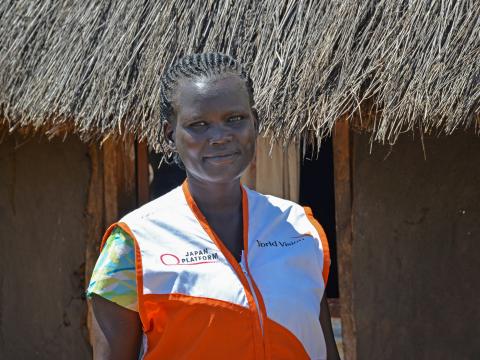Alice Joan; the hero in a sick child’s story!

by Aggrey Nyondwa Kikobera, World Vision Communications official, Uganda
Being a refugee as a child is tough; growing up away from home, being away from friends and sometimes parents. But, being a refugee child with a chronic disease is even more distressing. The stigma, the deprivation of the freedom to play with others or not having the energy to play with the rest of the children makes life miserable.
Such was the fate of more than 50 children battling Tuberculosis, HIV and AIDS, Hepatitis or other killer diseases in Swinga Village-Bidibidi Settlement.
Those around them (meant to take care of them) had more or less given up and couldn’t do much to revive the diminishing spirits of the sick children. Treating these diseases required extra care, attention, consistent adherence to medication and a special kind of feeding that was too much to expect from the nursing guardians.
Alice Joan restores children's hope.
Joan, a World Vision caseworker, based in Zone 2 in Bidibidi, noticed the suffering of these children when she was assigned to work in this area in May 2018. She vowed to work relentlessly to ensure a better life for them. She started working with seven children she met at the Swinga Health Centre who struggling to swallow their antiretroviral medication (ARVs). Having worked at a health centre previously as a counsellor, she instinctively knew that she could help, even if it meant just talking to them.
Joan reached out to the children, visited their homes and discovered that most of them had been abandoned by their parents and were under the care of foster parents. Some of them had given up on medication and decided to stay at home. The foster parents seemed to have undermined the severity of the sicknesses, but also lacked the resources to provide the support these children needed.
“When she came to me with the idea that she wants to dedicate a little more time helping these children, I couldn’t refuse," says Brenda Madrara, A World Vision child protection coordinator and Joan's supervisor. "Alleviating suffering and saving lives is at the core of what we do. At that time, there were seven critical cases, children who had given up on life, refused to take medicine or even visit the health centres. The parents had tried and failed. Joan’s timely intervention helped save these seven lives."
With her supervisor’s blessing, Joan started spending more time with the children, walking to their houses every day, bathing them, feeding them, going to the health centre to get their medication and strictly watching over them as they took the medicine.
“These children were at a very critical stage. They could have died. I swore to myself not to let them. I ensured they swallowed all their medication on time. I went the extra mile to buy them a little something to eat and fortunately, in a couple of weeks, life had started coming back in their eyes,” said Joan.
After restoring the seven lives, Joan identified more and the number grew to 14 critically ill children; 5 girls and 9 boys between the ages of 7 and 13. Through the case-by-case management system, Joan requested that World Vision support them with supplementary food and other needs. Her request was granted.
“At first, we thought this would be a challenge. But, with support from UNICEF, we managed to get some food in addition to the usual monthly food ration for the children. We thought about getting them beef but we also wanted something that could be sustained, this is why we opted for silverfish (mukene), which is just as nutritious,” Brenda added.
Given how strong the medications are, feeding was a major hindrance to the children adhering to their prescribed medication. With proper feeding and a supplementary diet, this started to change.
Joan’s success with these 14 cases was noticed and hailed across the village. As a result, she was tasked to look out for all the children in the 11 villages who were suffering from chronic illnesses, a responsibility that she jumped at with open hands. Moving from village to village, house to house and in the health centres, she identified more than 50 children. Added to her mandated caseload of 79 patients, she now had 129 children under her management, the caseworker with the biggest number of children in the settlement.
Her pride was evident as she explained how much this meant to her: “I know there should be more people working on these cases, but I feel like these are my children now. I know them more than anyone else. I am very happy and proud to look after them, even if it means walking through the whole village every day watching over them.”
Joan has also helped to increase the awareness of HIV and AIDS awareness in the community. She uses every opportunity she gets to engage community members against stigma and encourages all of them, including children, to support their fellow children who are suffering from this or other illnesses. She has educated parents and guardians on how to read and understand the instructions when giving the medicine and developed a schedule to follow in case she is not around.
Through her regular visits, she superintends and ensures that the supplementary food provided by World Vision is only served to the people it is meant for (the sick children), and not for every member of the family.
In partnership with UNICEF, World Vision is supporting more than 9,500 children in Bidibidi Refugee Settlement through early childhood development, psychosocial support, peace-building and case management. The latter includes case-by-case support where refugee children with special needs are identified and supported based on their different needs. These might include food, household items, shelter, etc... .